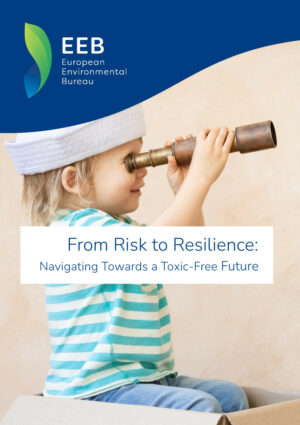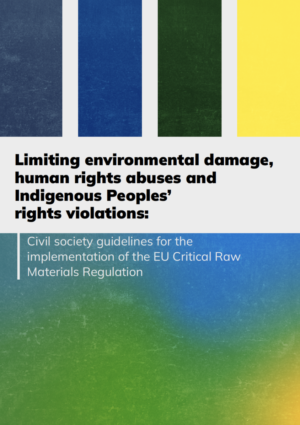
Limiting environmental damage, human rights abuses and Indigenous Peoples’ rights violations: Civil society guidelines for the implementation of the EU Critical Raw Materials Regulation
The following guidelines have been collaboratively crafted by multiple civil society organizations comprising the Raw Materials Coalition. These guidelines offer an insightful overview of four primary subjects addressed within the Critical Raw Materials Regulation (CRMR).
Whilst we are greatly concerned with the overall aims of the CRMR and what it may mean in terms of driving greater extraction of primary raw materials, increasing harms to nature and people, we write these guidelines to urge EU and national decision makers to implement the Regulation in a way that can limit these harms.
These guidelines therefore offer practical recommendations for implementation of the CRMR in a way that can help limit environmental damage, human rights abuses and Indigenous Peoples’ Rights violations based on the agreed-upon text. The first topic covered is the Raw Materials Consumption Reduction (Moderation) and Circular Economy. Secondly, these guidelines address Strategic Partnerships and Raw Materials Diplomacy, focusing on the external dimension of the CRMR’s objective to secure Strategic Raw Materials abroad. Thirdly, the guidelines address Free, Prior and Informed Consent (FPIC) and Indigenous Peoples Rights, leveraging the provisions under the UN Declaration on the Rights of Indigenous Peoples (UNDRIP). This section focuses on the importance of respecting their rights according to the international instruments as well as securing proper information, access to justice and involvement from local communities affected by industrial activity in the raw materials supply chains. Lastly, the guidelines address Certification and Industry Schemes, examining the substantial limitations inherent in certification schemes as a tool for bolstering due diligence while providing guidance on how they might evolve into a more credible component of a comprehensive environmental, human rights, and Indigenous Peoples’ rights risk assessment under the CRMR.
Raw material demand reduction is consequently highlighted as a key strategy to mitigate adverse impacts on local communities and Indigenous Peoples as well as the environment. While circularity measures are included in the CRMR, they require further development to go higher up the waste hiearchy. Emphasis is placed on operationalising moderation of demand through sufficiency measures, vital not only for increasing strategic autonomy but also for mitigating their impacts on people and the planet.
Recent documents added to the Library






